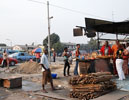
Events surrounding the murder of Congolese human rights defender Floribert Chebeya are developing rapidly, with significant political fallout in Kinshasa. Last weekend President Kabila suspended General John Numbi, the powerful head of the Congolese police forces, who Chebeya had told his wife he was going to meet the night before his body was found. Human Rights Watch has a detailed rundown of the events surrounding Chebeya’s murder and the initial shoddy efforts by authorities.
Sources in Kinshasa say that that several senior police officers arrested in connection to the murder have admitted to acting under the direction of General Numbi. Numbi, who is apparently under house arrest in Kinshasa, denies ordering his death. It’s worth noting that John Numbi is not just the head of the police, but also a senior figure within President Kabila’s small inner circle, who has been a major player in Kinshasa’s renewed relationship with Rwanda during the past 18 months.
Chebeya’s assassination is a daunting blow to human rights across Congo. But the controversy surrounding his assassination is already becoming a major political liability for President Kabila and his government, which is already under pressure for seeking the withdrawal of U.N. peacekeepers by the end of 2011.
Under mounting pressure from Chebeya’s family, Congolese civil society, and the international community, the Congolese government has accepted assistance from a team of Dutch doctors in the performance of the autopsy, scheduled to take place tomorrow on June 11. Why this turnaround, given the strong opposition to international participation in the investigation from senior government officials in Kinshasa? Now that it is obvious that Chebeya’s death was the result of a well-planned assassination, it appears the government is betting that the doctors will uncover little new information from the autopsy. Meanwhile, the government continues to refuse international involvement in the investigation.
It’s crucial that the world keep up the pressure on the Congolese government for an international investigation. The key question is not whether this was an assassination; it clearly was. The key question is who committed the crime and for what reason?
As Jason Stearns notes at Congo Siasa, these events are unfolding at a politically sensitive moment, with both the 50th anniversary of Congo’s independence and decisions about debt relief rapidly approaching. Kabila appears to be undertaking a full-court press to manage the controversy and was just in Bukavu visiting Chebeya’s extended family. But it is too soon to tell whether he will make the choice to ensure a rigorous and transparent investigation of Chebeya’s murder, or whether the steps taken thus far are just window dressing designed to avoid international involvement. Stay tuned.
Photo: Street in the Congolese capital of Kinshasa (Enough/Laura Heaton)

